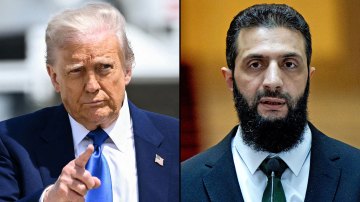In a surprising turn of events, former U.S. President Donald Trump has indicated plans to lift sanctions on Syria, a move he attributes to discussions with Turkish President Recep Tayyip Erdoğan. Trump revealed that the decision aims to open a new chapter for Syria, promoting economic development and stability in the war-torn nation. This decision, which comes after years of strict economic restrictions, is expected to reshape diplomatic and economic landscapes in the Middle East.

A Strategic Shift: Why Lift Sanctions Now?
The sanctions on Syria were originally imposed to pressure the Syrian government amid civil unrest and alleged human rights violations. These sanctions targeted key sectors, including energy, construction, and finance, severely limiting Syria’s economic growth. However, Trump’s announcement suggests a broader strategy aimed at regional stability and economic partnership. According to sources close to the White House, Trump believes that lifting sanctions could encourage investment and rebuild infrastructure, ultimately reducing the influence of rival powers in the region.
wararka soomaalida
The timing of this announcement coincides with broader discussions on energy cooperation and economic integration in the Middle East. Analysts speculate that the move is part of a larger framework that includes energy partnerships with Gulf states and Israel, leveraging Syria’s strategic location for oil and gas transit.
Erdoğan’s Role in the Decision
President Erdoğan’s influence in the decision to lift sanctions cannot be understated. As a key regional player, Turkey has maintained a complex relationship with Syria, oscillating between conflict and cooperation. Trump’s acknowledgment of Erdoğan’s involvement points to a potential diplomatic alliance that could reshape the geopolitical fabric of the Middle East.
Erdoğan has long advocated for normalized relations with Syria, citing economic and security benefits for both nations. Turkish-backed initiatives in northern Syria have already laid the groundwork for economic zones that bypass traditional Syrian governance. With sanctions lifted, Turkey is poised to expand its influence through investments and reconstruction projects, benefiting from enhanced trade routes and energy partnerships.
The Trump Tower Project in Damascus: Reality or Speculation?
One of the more controversial elements of this announcement is the rumored construction of Trump Tower in Damascus. According to reports from sources close to the White House, plans are underway to establish a commercial hub in the heart of Syria’s capital. This ambitious project aims to serve as a gateway for American and Israeli businesses, facilitating smoother access to Syrian markets and the broader Middle East.
If realized, Trump Tower Damascus would symbolize a major shift in U.S.-Syria relations, opening doors to economic opportunities previously thought impossible under the weight of sanctions. Critics, however, question the feasibility of such a project amid lingering political instability and security concerns.
Implications for U.S., Israel, and Global Politics
Lifting sanctions on Syria would undoubtedly have far-reaching implications for U.S. foreign policy and its allies, particularly Israel. Enhanced American and Israeli presence in Syria, facilitated by business hubs like Trump Tower, could alter the balance of power in the region. Furthermore, this economic engagement could reduce dependency on Russian and Iranian support, shifting the dynamics of Middle Eastern politics.
Israeli officials have expressed cautious optimism, seeing the potential for economic partnerships that could bolster security cooperation and stabilize the border regions. Meanwhile, global reactions are mixed, with some welcoming the chance for reconstruction, while others view it as a geopolitical maneuver to consolidate American influence.
Conclusion: A New Chapter for Syria and the Middle East?
Trump’s decision to pursue the lifting of sanctions on Syria could mark the beginning of a transformative era for the region. By opening economic pathways and inviting international investment, Syria has the potential to emerge as a key player in Middle Eastern energy and commerce. Whether the proposed Trump Tower in Damascus becomes a reality remains to be seen, but the broader implications of this policy shift are already making waves on the global stage.






























